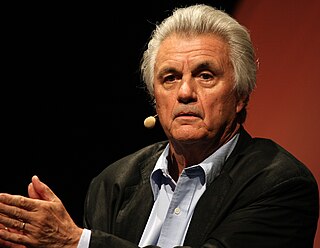
John Winslow Irving is an American-Canadian novelist, short story writer, and screenwriter.

Robert Lee Frost was an American poet. His work was initially published in England before it was published in the United States. Known for his realistic depictions of rural life and his command of American colloquial speech, Frost frequently wrote about settings from rural life in New England in the early 20th century, using them to examine complex social and philosophical themes.
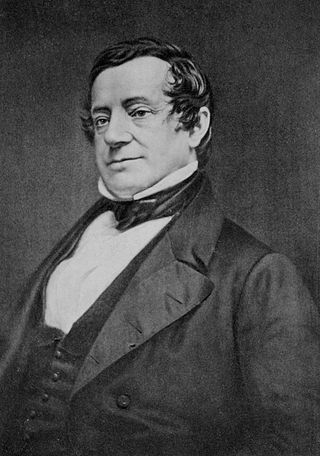
Washington Irving was an American short-story writer, essayist, biographer, historian, and diplomat of the early 19th century. He is best known for his short stories "Rip Van Winkle" (1819) and "The Legend of Sleepy Hollow" (1820), both of which appear in his collection The Sketch Book of Geoffrey Crayon, Gent. His historical works include biographies of Oliver Goldsmith, Muhammad, and George Washington, as well as several histories of 15th-century Spain that deal with subjects such as the Alhambra, Christopher Columbus, and the Moors. Irving served as American ambassador to Spain in the 1840s.
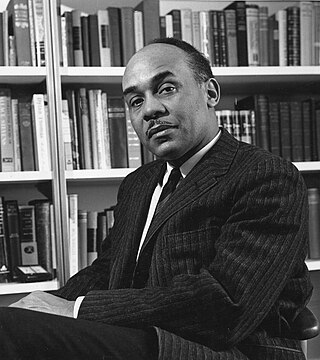
Ralph Ellison was an American writer, literary critic, and scholar best known for his novel Invisible Man, which won the National Book Award in 1953. He also wrote Shadow and Act (1964), a collection of political, social, and critical essays, and Going to the Territory (1986). The New York Times dubbed him "among the gods of America's literary Parnassus." A posthumous novel, Juneteenth, was published after being assembled from voluminous notes he left upon his death.

Richard Nathaniel Wright was an American author of novels, short stories, poems, and non-fiction. Much of his literature concerns racial themes, especially related to the plight of African Americans during the late 19th to mid-20th centuries suffering discrimination and violence. Literary critics believe his work helped change race relations in the United States in the mid-20th century.

Native Son (1940) is a novel written by the American author Richard Wright. It tells the story of 20-year-old Bigger Thomas, a black youth living in utter poverty in a poor area on Chicago's South Side in the 1930s.

Dead Man is a 1995 American acid western film written and directed by Jim Jarmusch. It stars Johnny Depp, Gary Farmer, Billy Bob Thornton, Iggy Pop, Crispin Glover, John Hurt, Michael Wincott, Lance Henriksen, Gabriel Byrne, Mili Avital, and Robert Mitchum. The movie, set in the late 1800s, follows William Blake, a meek accountant on the run after murdering a man. He has a chance encounter with enigmatic Native American spirit-guide "Nobody", who believes Blake is the reincarnation of the visionary English poet William Blake.

James Arthur Baldwin was an American writer. He garnered acclaim for his work across several mediums, including essays, novels, plays, and poems. His first novel, Go Tell It on the Mountain, was published in 1953; decades later, Time magazine included the novel on its list of the 100 best English-language novels released from 1923 to 2005. His first essay collection, Notes of a Native Son, was published in 1955.
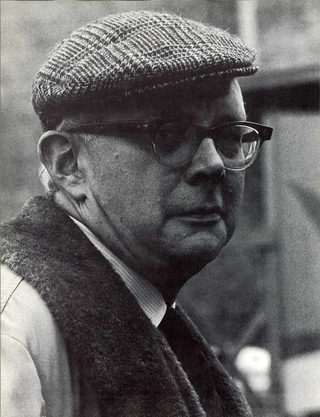
Irving Howe was an American literary and social critic and a prominent figure of the Democratic Socialists of America.

Winesburg, Ohio is a 1919 short story cycle by the American author Sherwood Anderson. The work is structured around the life of protagonist George Willard, from the time he was a child to his growing independence and ultimate abandonment of Winesburg as a young man. It is set in the fictional town of Winesburg, Ohio, which is based loosely on the author's childhood memories of Clyde, Ohio.
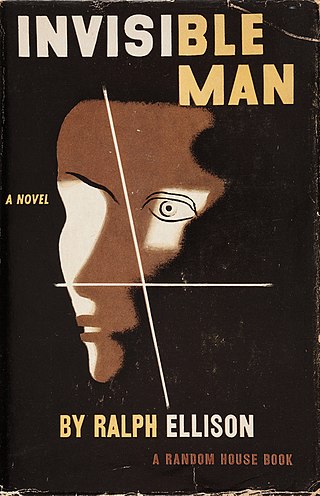
Invisible Man is Ralph Ellison's first novel, published by Random House in 1952. It addresses many of the social and intellectual issues faced by African Americans in the early 20th century, including black nationalism, the relationship between black identity and Marxism, and the reformist racial policies of Booker T. Washington, as well as issues of individuality and personal identity.
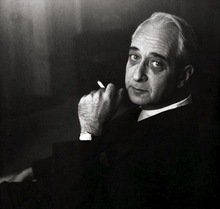
Lionel Mordecai Trilling was an American literary critic, short story writer, essayist, and teacher. He was one of the leading U.S. critics of the 20th century who analyzed the contemporary cultural, social, and political implications of literature. With his wife Diana Trilling, whom he married in 1929, he was a member of the New York Intellectuals and contributor to the Partisan Review.
Daniel Fuchs was an American screenwriter, fiction writer, and essayist.

The Sketch Book of Geoffrey Crayon, Gent., commonly referred to as The Sketch Book, is a collection of 34 essays and short stories written by the American author Washington Irving. It was published serially throughout 1819 and 1820. The collection includes two of Irving's best-known stories, attributed to the fictional Dutch historian Diedrich Knickerbocker: "The Legend of Sleepy Hollow" and "Rip Van Winkle". It also marks Irving's first use of the pseudonym Geoffrey Crayon, which he would continue to employ throughout his literary career.

Notes of a Native Son is a collection of ten essays by James Baldwin, published in 1955, mostly tackling issues of race in America and Europe. The volume, as his first non-fiction book, compiles essays of Baldwin that had previously appeared in such magazines as Harper's Magazine, Partisan Review, and The New Leader.

The Price of the Ticket is a collection of James Baldwin's writing that was published in 1985. It is a collection of essays spanning the years from 1948 to 1985. These are Baldwin's commentaries on race in America.

Shadow and Act is a 1964 collection of essays by Ralph Ellison.

Soul on Ice is a memoir and collection of essays by Eldridge Cleaver. Originally written in Folsom State Prison in 1965, and published three years later in 1968, it is Cleaver's best known writing and remains a seminal work in African-American literature. The treatises were first printed in the nationally-circulated monthly Ramparts and became widely read for their illustration and commentary on Black America. Throughout his narrative, Cleaver describes not only his transformation from a marijuana dealer and serial rapist into a convinced Malcolm X adherent and Marxist revolutionary, but also his analogous relationship to the politics of America.
Edward Margolies was an American literary critic and biographer.
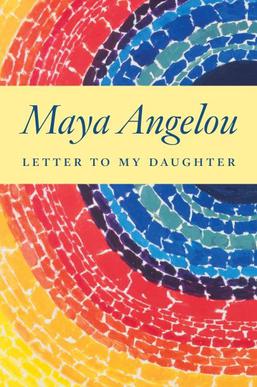
Letter to My Daughter (2009) is the third book of essays by African-American writer and poet Maya Angelou. By the time it was published, Angelou had written two other books of essays, several volumes of poetry, and six autobiographies. She was recognized and highly respected as a spokesperson for black people and women, and had become "a major autobiographical voice of the time". Angelou had no daughters herself, but was inspired to write Letter as she was going through 20 years of notes and essay ideas, some of which were written for her friend Oprah Winfrey. Angelou wrote the book for the thousands of women who saw her as a mother figure, and to share the wisdom gained throughout her long life.















